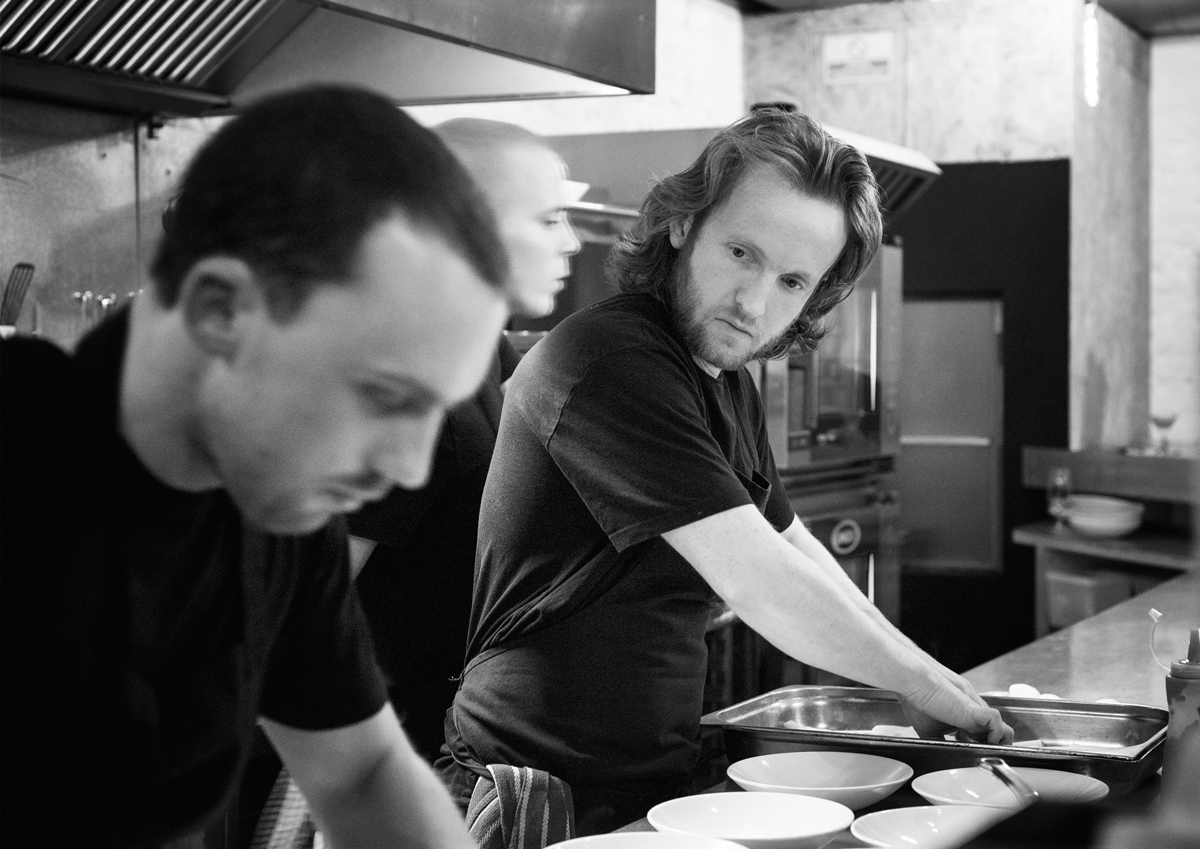When Douglas McMaster first opened a restaurant without a bin to challenge the status quo and create a new zero waste system, many people told him he’d never succeed. Like a red rag to a bull, this fired him up more than ever and for the past five years McMaster has run Silo in Brighton, the UK’s first zero waste restaurant.
According to the Food and Agriculture Organization (FAO), one third of all food produced in the world is lost or wasted, but McMaster’s innovative kitchen team goes to extreme lengths to avoid any waste whatsoever. They mill their own flour from whole wheat, brew their own beer, churn milk into cheese and yogurt, source off-grid and sustainable veg, compost organic waste in an aerobic digester and grind down glass wine bottles to cast glass porcelain plates.

“Composting is the easy bit really. We use Full Circle Farms who transform our food waste directly into compost that then grows food for chefs on their designated plot of land,” says McMaster. The tricky part is reverse engineering the supply chain with ‘systemic intervention’ to source whole, natural foods direct from producers: “The way of the world is an industrial supply chain– chefs call the wholesaler and get whatever we want, domestic consumers go to the supermarket – but when you’re trading with the origin, the logistics are incredibly difficult and it took years to get right. I’m asking the farmer or fisherman to change the way they work, when they are tethered into this industrial supply chain.”
Moving his restaurant from Brighton to London (Silo is due to reopen in Hackney this September), he’s about to face all those challenges again with a new set of suppliers. “But now the world is a different place – five years ago, there was no other zero waste restaurant in the world. But now everybody is tuned in to the global demise and the ecological crash that’s ahead of us,” he comments. With growing public awareness and momentum for positive action, that’s where Silo comes in.

“Our food is all about sex appeal – it’s got to be delicious and exciting, that’s always been our game plan from day one,” says McMaster, whose seasonal dishes for July include sheep heart with kale and red grapes, steamed celeriac glazed in treacle with kelp and elderberry, or retired sheep, patty pans and marjoram.
Silo’s pre-industrial menu is fully appreciative of vegan diets as well as serving paleo-style dishes that are ethically sourced from high-welfare whole animals, fish sustainably caught by hook and line, and ethically-produced milk and cream delivered in reusable stainless-steel pails.
“To achieve zero waste is to integrate with nature – we just need to change our thinking,” says McMaster who is dyslexic, dropped out of school at 16 and fell into kitchens working with some of the world’s top chefs. St John in London, famous for its nose-to-tail ethos, is where he learnt to trust a sense of ‘magical intuition’ and he now embraces the need to make mistakes in order to reinvent the wheel.

A prime example of McMaster’s kitchen wizardry took place when he was feeling “a bit delirious one day” – while holding a bunch of carrots under his arm, he noticed the compost smelt like citrus because the brewers had put 60kg of organic lemon waste into the aerobic digester.
“Creativity is all about openness – being open to a carrot being cooked in compost is a big first step in the creative process. The second step is to actually follow through and try something new. To me, cooking carrots in that compost made sense and resulted in a profound transfer of flavour,” says McMaster.
McMaster insists that the modern food system needs to be torn to the ground and explains that we can make changes right now. “Home cooks and professional chefs can abstain from [buying] processed foods, and complain about industrial-scale food packaged in single-use plastic.” He suggests shopping in bulk stores or farmers’ markets and cooking in bulk, too: “I cook all my sauces and stocks from scratch in bulk and freeze them, I ferment grapes and pickle Japanese knotweed in batches and keep all the jars ready on the shelf.”

So, can Silo’s pre-industrial food system be scaled up to feed the world’s rapidly-growing population? “If we want to feed 10 billion people with natural food, we just need to change our thinking and go back to basics. Natural holistic farming needs to become desirable – that’s what I want to see in the world, that would change everything,” says McMaster.
“Nature has been evolving for millions of years – in a single teaspoon of nutrient-dense soil, there are millions of microorganisms – we have to look at what’s natural.” That said, he’s says he’s no luddite: “I’m all about industrialism for efficiency, for transport. It’s a scale thing and that’s crucial to our organisation as humans. However, nature is the reason we’re here. We should always be asking ‘does this harm nature?’”
SILO: The Zero-Waste Blueprint by Douglas McMaster (£20, published by Leaping Hare Press) is out now.












0 Comments